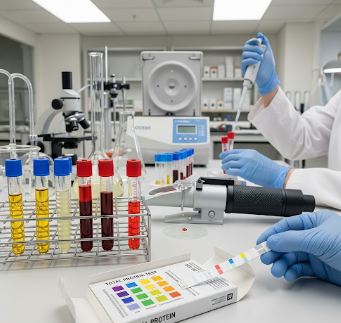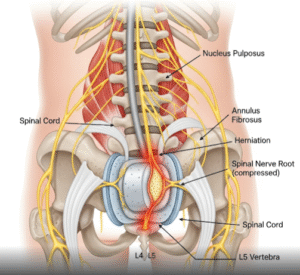What it is
The Total Protein Test is a blood test that measures the total amount of protein in the blood, including albumin and globulin.
➡ Key facts:
- Albumin → Helps maintain fluid balance, transports hormones, vitamins, and drugs
- Globulins → Play a role in immune function, blood clotting, and disease defense
- Measures the overall nutritional and health status
- Commonly used to screen for liver, kidney, and nutritional disorders
- Available in hospitals, diagnostic laboratories, and clinics across Korea
💡 The total protein test provides critical information about a patient’s metabolic, immune, and nutritional health.
Why it’s done
Doctors recommend a total protein test to:
➤ Evaluate nutritional status → Detect malnutrition or protein deficiency
➤ Assess liver function → Abnormal levels can indicate liver disease or cirrhosis
➤ Assess kidney function → Protein loss in urine may reflect kidney disorders
➤ Monitor chronic conditions → Chronic infections, autoimmune disorders, or cancer
➤ Screen during routine checkups → Early detection of potential health issues
⚠ Abnormal protein levels can indicate serious conditions and require further investigation.
Alternatives / Complementary Measures
Other tests that complement the total protein test include:
✔ Albumin and globulin fractions → Detailed breakdown of protein types
✔ Liver function tests (LFTs) → Assess liver health
✔ Kidney function tests → Blood urea, creatinine, and urine protein
✔ Electrophoresis → Identifies abnormal globulin patterns
✔ Nutritional assessment → Dietary evaluation and lab tests for vitamin/mineral status
⚠ A total protein test alone cannot diagnose a disease; it is used with other laboratory tests.
Preparation
Before undergoing a total protein test in Korea:
🔹 Fasting → Usually not required, but some labs recommend 8–12 hours fasting for comprehensive panels
🔹 Medication disclosure → Inform your doctor about supplements, steroids, or protein-containing IV fluids
🔹 Hydration → Drink water to facilitate blood draw
🔹 Medical history → Chronic illness, liver or kidney disease, recent infections, or pregnancy
💡 Korean diagnostic centers provide pre-test guidance to ensure accuracy.
How it’s done
➡ Step-by-step procedure:
- Blood collection → Sample taken from a vein in the arm
- Lab analysis → Measures:
- Total protein in g/dL or g/L
- Albumin and globulin levels
- Albumin/globulin ratio
- Result interpretation → Compared to reference ranges to detect abnormalities
💡 The procedure is quick, safe, and minimally invasive, taking only a few minutes.
Effectiveness & Accuracy
✔ Reliable marker for overall protein status and organ function
✔ Sensitive to nutritional and metabolic changes
✔ Used with other tests for comprehensive assessment of liver, kidney, or immune disorders
✔ Korean labs utilize automated analyzers to ensure accurate and consistent results
💡 Early detection through total protein testing can guide timely interventions for chronic or acute conditions.
Recovery / Expected Outcomes
✔ Immediate recovery → Patients can resume normal activities immediately after blood draw
✔ Minor discomfort → Possible mild bruising or soreness at the puncture site
✔ Follow-up → Doctor may recommend:
- Dietary adjustments for protein deficiency
- Further testing for liver or kidney disorders
- Treatment for underlying chronic diseases
💡 Total protein testing allows continuous monitoring of nutritional and organ health.
Complications / Risks
⚠ Total protein testing is very safe, with minimal risks:
➡ Bruising or discomfort at the blood draw site
➡ Rare infection at the puncture site
➡ Temporary dizziness for sensitive patients
➡ Inaccurate results if blood sample handling is improper or patient is dehydrated
💡 Korean diagnostic centers follow strict sterile protocols to prevent complications.
Treatment Options in Korea (After Testing)
🔹 Nutritional intervention → Protein-rich diet, supplements if deficiency detected
🔹 Medical management → Treat underlying liver, kidney, or immune disorders
🔹 Monitoring → Repeat testing to track progress or response to treatment
🔹 Specialist consultation → Dietitian, nephrologist, or hepatologist for targeted care
🔹 Lifestyle adjustments → Adequate hydration, balanced diet, and management of chronic conditions
💡 Korea emphasizes personalized care and integrated follow-up for patients with abnormal total protein results.
Top Hospitals & Labs in Korea for Total Protein Testing
🏥 Seoul National University Hospital (SNUH) – Comprehensive diagnostic laboratory services
🏥 Asan Medical Center (Seoul) – High-volume testing with rapid result turnaround
🏥 Samsung Medical Center (Seoul) – Integrated testing and follow-up care for chronic disease
🏥 Major private diagnostic laboratories – Nationwide access with advanced automation
🏥 Specialized nutrition and metabolic centers – Provides combined lab testing and dietary counseling
Conclusion
The Total Protein Test in Korea is a simple, reliable, and essential blood test for evaluating nutritional status, liver and kidney function, and overall health.
✔ Quick, safe, and minimally invasive procedure
✔ Provides insights into protein levels, albumin, globulin, and A/G ratio
✔ Guides management of malnutrition, chronic disease, and organ dysfunction
✔ Korean labs ensure accurate results, rapid reporting, and professional interpretation
By offering advanced testing, accurate analysis, and integrated follow-up care, Korea enables patients to maintain optimal health and address potential medical issues promptly.













